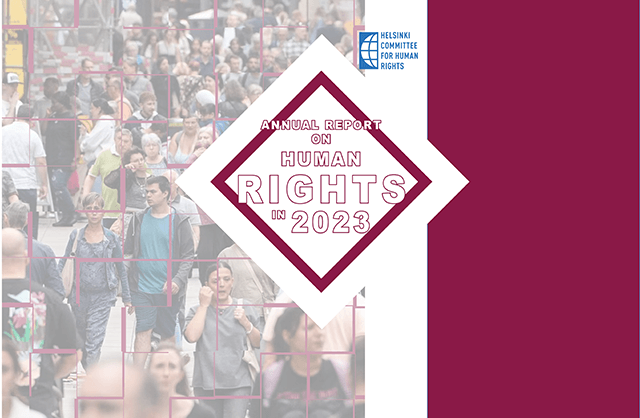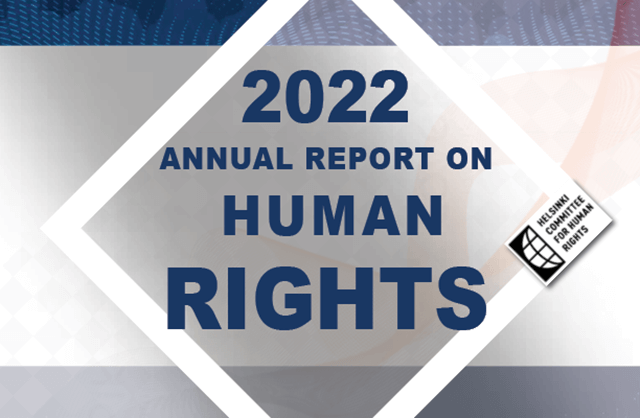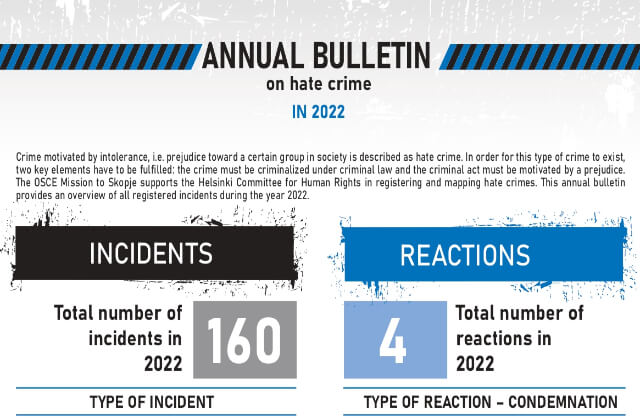Annual report on human rights in 2023
July 2, 2024

While Russia’s military invasion of Ukraine has continued unabated in 2023, in Gaza the world has borne witness to the largest humanitarian disaster since World War II. Countless adults and children are not only killed in military attacks but die daily of hunger and dehydration. This disaster has brought to light the global struggle for human rights, especially with the rise of authoritarian
governments that violate international laws and ignore basic rights. Mass protests around the world, including among members of the Jewish community, reflect global opposition to the events unfolding in Gaza. However, it is uncertain when this crisis will end. What is clear is that the gap between the rich and the poor is widening, and the most vulnerable groups of citizens are again bearing the brunt of these circumstances.
Based on the 2023 findings by the Helsinki Committee for Human Rights in the Republic of North Macedonia, it can be concluded that there has been no significant progress in the legal and institutional system for the protection and promotion of human rights.
The year was marked by events related to intensified and overt actions of anti-gender movements. These movements use gender and sexuality as a central part of their rhetoric, framing issues like reproductive rights, LGBTI+ rights, and gender equality in ways that incite fear and division in society. Through propaganda, pressure on local and state institutions, misinformation, and hate speech in public discourse, these anti-gender movements were able to prevent the passing of a new Law on Gender Equality.
The election process for new members of the State Commission for Prevention of Corruption and the State Commission for Prevention and Protection against Discrimination was characterized by partisanship and rigging. The issues involving the Judicial Council, the amendments to the Criminal Code, and the amendments to the laws related to the contract with the “Bechtel and Enka” consortium have
highlighted significant weaknesses in the judicial system and the relationship between the legislative and judicial authorities.
After the amendments to the Criminal Code in September 2023, civil society organizations considered it pointless to participate in a procedure that essentially legitimizes illegality. Taking into account the declining trust of citizens in the judiciary, the Helsinki Committee
conducted monitoring of court proceedings in response to citizens’ requests or proceedings of wider social interest. Throughout the year 2023, the Helsinki Committee for Human Rights provided legalaid to 307 citizens in the fields of labor relations, social and health care, child protection, family and gender-based violence, pension and disability insurance, property relations, criminal law, and other areas. Particularly concerning labor rights, the repercussions of the energy-economic crisis,stemming from global market instability and the rise in prices at the global level were notably felt, leading to increased prices of goods and services, high inflation, and a decline in the standard of living of the workers. Rather than adopting the Law on Labor Relations, which would improve the position of the workers, amendments were made to the LLR, favoring the “Bechtel and Enka” consortium.
In 2023, the Helsinki Committee made 10 visits to penitentiary institutions. Despite efforts by the state, international, and domestic organizations to improve conditions in prisons, there are still serious systemic deficiencies. Convicted individuals lack adequate access to healthcare, their living conditions are miserable, and resocialization programs, conditions for their implementation, and
post-penal assistance are still insufficient and inapplicable. Corruption and bribery are common in the daily lives of those incarcerated. In terms of marginalized communities, the Roma are disproportionately subjected to torture and degrading treatment.
In general, one of the most significant threats to the protection of human rights and the fight against discrimination is citizens’ lack of trust in institutions. When it comes to the degree of reduction of the marginalized status of the Roma community in society, the fact that the court process against the segregation of Roma children has been going on for three years already speaks volumes.
In 2023, the Appellate Court in Skopje fully confirmed the judgment of the Basic Civil Court in Skopje, which stated that the Government of the Republic of North Macedonia and the State Election Commission (SEC) had committed direct discrimination against persons with disabilities in exercising their right to vote. Both proceedings were initiated by the Helsinki Committee as public interest proceedings
(actio popularis).
An example that highlights a lack of awareness of the human rights of the different, and most vulnerable among us, as well as a lack of empathy, is the case of a 17-year-old boy with autism who was confined in Demir Hisar Psychiatric Hospital. This is just one example that illustrates the extremely concerning situation in psychiatric hospitals, particularly regarding violence and the improper and inhumane treatment of patients.
The fact that individuals are subjected to highly inhumane treatment, which goes against international principles, standards, laws, and conventions, is alarming. Hate speech, as a malignant social phenomenon, is increasingly prevalent in public discourse. In 2023, it’s on the rise and ranks first in cases related to ethnicity, with hate speech based on sexual orientation following closely in second place. The committee has documented a total of 1,171 cases of hate speech.
On November 29, 2023, the Parallel Civil Society Conference was held, marking the end of North Macedonia’s OSCE Chairpersonship. The conference was organized by the Committee and partners in cooperation with the Civic Solidarity Platform – a network of civil organizations in the OSCE region. Over 120 representatives of civil society gathered at the event, and the Skopje Declaration
was adopted, emphasizing the need to strengthen civil society and urging the participating countries to continue their commitment to the human dimension.
The 2023 annual report of the Helsinki Committee contains specific cases from real-life examples that clearly illustrate deep-rooted systemic issues and their impact on the rights of citizens in the country.

